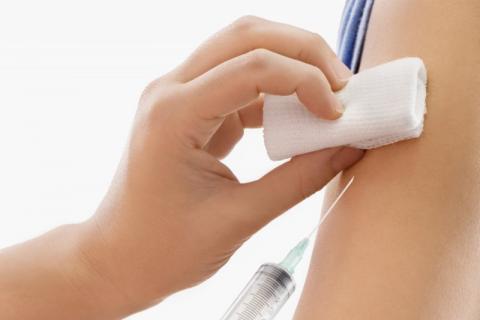Importance of immunisation from pre-birth to teenage years highlighted

The Public Health Agency (PHA) is marking European Immunisation Week (24–30 April 2016) by celebrating the excellent childhood immunisation uptake levels being achieved in Northern Ireland, but also reminding parents of the importance of immunisation.
Many childhood diseases which were common in Northern Ireland prior to the introduction of vaccination have been dramatically reduced or have disappeared altogether, such as polio, diphtheria, tetanus, measles and several types of meningitis.
In Northern Ireland, thousands of cases of serious illness and many deaths are avoided each year thanks to a highly successful immunisation programme, but there is still a small percentage of children who do not receive full protection. The PHA wishes to promote the core message that immunisation of every child is vital to help prevent diseases and protect life.
Dr Lucy Jessop, Consultant in Health Protection at the PHA, said: “Even before birth we can help protect our children – the whooping cough vaccine offered to pregnant women provides a high level of protection for your newborn baby in their first weeks of life by allowing antibodies to pass from pregnant mum before birth.
“The uptake of this vaccine has so far has been lower than expected at around 60%, but by getting vaccinated the baby’s risk of being infected is reduced by over 90%, so we want mums-to-be to avail of it.
“The best time to get the vaccine is between 28 and 32 weeks of pregnancy, but if a woman misses out during this time, she can still get it after 32 weeks. The vaccine is given at your GP’s surgery – make sure you make an appointment to get it.”
The PHA is also highlighting to parents the importance of children getting their immunisations on time and of ensuring they receive all the vaccines they are due.
Dr Jessop continued: “Childhood immunisation in Northern Ireland has uptake rates of over 98% for the primary vaccines by two years of age and by five years of age around 97% of children have had one dose of MMR and 93% have had the recommended two doses, which is an excellent achievement. However, I would urge the small remainder of parents whose children have not yet received the full level of protection against serious diseases, to do so. Vaccination is very quick to do, but the benefits are massive for a child’s health and wellbeing.”
Immunisation is just not limited to young children, so the PHA is reminding all 16 to 18 year olds to also get a free vaccination that can help protect against meningococcal disease.
From the beginning of April, GPs are inviting people born between 2 July 1997 and 1 July 1999 to have the MenACWY vaccine. It will help protect against four different causes of meningitis and septicaemia – meningococcal A,C,W and Y diseases.
Dr Jessop added: “Older teenagers are at higher risk of getting Meningococcal W disease (MenW), so you need to get vaccinated to help protect yourself. It will also reduce the risk of you carrying the bacteria, therefore offering better protection to those around you. MenW was generally rare in the UK, but there has been an increase in cases in recent years.
“Even if you have recently had the MenC vaccine, for example in school, you should still get the MenACWY vaccine. It will increase your protection against MenC and provide additional defence against the three other meningococcal groups.
“The vaccine will be administered in a phased approach so don’t worry if you don’t hear from your GP straight away. We would say, however, that if you are in the eligible age group and have had no communication from you GP by July, contact them and arrange an appointment.”
For more information on the MenACWY vaccination programme visit www.pha.site/MenACWY
Ends
